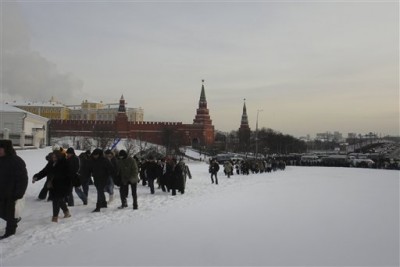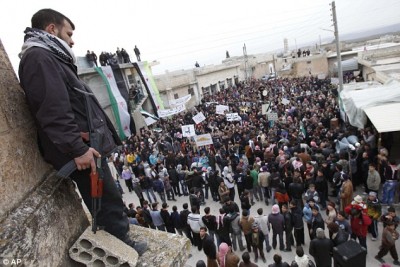
By THOMAS L. FRIEDMAN
To observe the democratic awakenings happening in places like Egypt, Syria and Russia is to travel with a glow in your heart and a pit in your stomach.
The glow comes from watching people lose their fear and be willing to take enormous risks to assert, not a particular ideology, but the most human of emotions: the quest for dignity, justice and the right to shape one’s own future. I was in Moscow on Saturday morning — just as the demonstrations against Prime Minister Vladimir Putin were gathering. It was minus-4 Fahrenheit. A simple rule: Whenever 120,000 people gather to rally for democracy — and you can see your breath and can’t feel your fingers — take it seriously.
Putin’s allies were predicting that only a small crowd would brave the weather. They were wrong, and it underscores something that a lot of cynics regarding these awakening movements just don’t get. They’re like earthquakes or volcanoes. They are totally natural phenomena, and they emerge from a very deep place in people’s souls. Those mounting them are not sitting around calculating the odds of success before they start. They just happen. Anyone who thinks that President Obama could have saved former President Hosni Mubarak of Egypt is as delusional as anyone who thinks Obama is behind the protests against Putin. We’re all spectators, watching an authentic human wave.
But that pit in the stomach comes from knowing that while the protests are propelled by deep aspirations for dignity, justice and self-determination, such heroic emotions have to compete with other less noble impulses and embedded interests in these societies.
Take Syria. I have no doubt that many of the Syrians mounting the uprising against the Assad regime — which is dominated by a Shiite offshoot known as the Alawites, who make up about 10 percent of the country — are propelled by a quest for a free and pluralistic Syria. But have no illusions: Some are also Sunni Muslims — who are the majority there — seeing this as their chance to overthrow four decades of Alawite minority rule. Where win-win democratic aspirations stop in Syria and rule-or-die sectarian fears begin is very hard to untangle.
Consider this paragraph from an article about Syria in The Times on Saturday by Nada Bakri, a Beirut correspondent: “A 34-year-old teacher from the Alawite sect said her life had changed in ways she never imagined. Six months ago, she started covering her head like Sunni Muslim women, hoping not to stand out. Her husband, an officer in the Syrian Army, rarely leaves his base to come home. She said she and their two sons had not seen him in months. A few weeks ago, her landlord, a Sunni, asked her to leave the house because his newly married son wanted to move in. ‘Sunnis have begun to feel empowered,’ the teacher said. ‘A year ago, no one would have expected this to happen.’ She had already made plans to return to her village.”
With good reason. There is a lot of pent-up anger there. The Assad family has run Syria as an Alawite mafia syndicate since 1970. While the Assad clan may have been a convenient enforcer at times for Israel and the West, it has also been a huge agent of mayhem — killing Lebanese journalists and politicians who dared to cross Syria, arming Hezbollah, funneling insurgents into Iraq, serving as a launching pad for Iranian mischief, murdering its own people seeking freedom and spurning any real political and economic reform. Syria has no future under Assad rule.
But does it have a future without them? Can this multisectarian population democratically rule itself, or does it crack apart? No one can predict. The Syrian opposition is divided, by sects, by politics, by region, by insiders and outsiders. We need to support them, provided they come together on a pluralistic reform agenda. Opposition leaders owe that to the brave Syrian youths who have taken on this regime bare-handed. The only chance of President Bashar al-Assad agreeing to some kind of peaceful transition, and not endless civil war, is if he is faced with a real united opposition front. It’s also the only hope for reforming Syria.

This will be hard. You can’t have a democracy without citizens, and you can’t have citizens without trust — without trust that everyone will be treated with equality under the law, no matter who is in power, and without trust in a shared vision of what kind of society people are trying to build.
America has that kind of trust because our country started with a shared idea that attracted the people. The borders came later. In most of the Arab states awakening today, the borders came first, drawn by foreign powers, and now the people trapped within them are trying to find a shared set of ideas to live by and trust each other with as equal citizens.
Iraq shows how hard it is to do that — the Sunni-Shiite divide still cuts very deep — but Iraq also shows that it is not impossible.
We often forget how unusual America is as a self-governing, pluralistic society. We elected a black man whose grandfather was a Muslim as president at a time of deep economic crisis, and now we’re considering replacing him with a Mormon. Who in the world does that? Not many, especially in the Middle East. Yet, clearly, many people there now deeply long to be citizens — not all, but many. If that region has any hope of a stable future, we need to bet on them.

Leave a Reply
You must be logged in to post a comment.